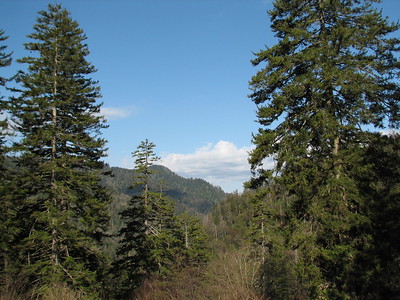Great Smoky Mountains

Great Smoky Mountains National Park comprises a natural landscape of undisturbed, scenic forests.
They hold flora and fauna species that survived the Pleistocene Ice Ages and are rarely found in temperate zones elsewhere. It is floristically very diverse, with fourteen major forest types and 105 native tree species. Wildlife includes the black bear and the white-tailed deer, and the park has the world’s greatest diversity of salamander species.
Community Perspective: one of the most visited sites overall due to the close proximity to the eastern cities, it is best done over 2 days and on weekdays. Parking anywhere over 15 minutes since 2023 requires an official paid parking tag. Still, it is quite pristine and there are good hiking opportunities. Four out of the eight reviewers spotted a black bear.


Map of Great Smoky Mountains
Community Reviews
Darren013
My family went over spring break to the Sevierville area. We stayed in a nice cabin with wonderful views of the mountains in a very secluded hamlet. I went on two hikes. One was through a little river, and then we went into an almost tropical environment. We walked through some beautiful wildflowers and stopped at a picturesque waterfall at the end. The other hike we went on was the Alum Cave/Mt. LeConte Trail, and it was the most beautiful trail I have ever seen. The first mile you are traversing through a river, and then you go through an arch rock natural formation that is pretty cool. Then you start going up a little bit, and there is a beautiful corner that you can climb on and see the view below. Once you reach Alum Cave, you realize it is more of an overhang, but still really nice. Then, after that, you start heading up. The terrain gets steeper, and the trail is rocky. But it is no doubt amazing views. This is the part where it is just astonishing. You are so high up, and when it is cloudy, you are mesmerized. The last part of the hike is my favorite, and you go through a spectacular pine forest that just gobbles you up. At the top, there is a lodge with a staff and some cabins. The staff was nice and the accommodation was excellent. I couldn't recommend this hike enough, it is top tier and the best scenery I have ever seen. I went in the spring, and I would encourage anyone else to do so, as it is green but does not cover up all the scenery. Seriously cannot recommend this enough. If I had pictures on this computer, I would show them.
DutchHorn

In June we went on a vacation to the Smokey Mountains. I had promised myself a real vacation this year which involves going somewhere that I had not been yet and did not involve visiting family. This vacation fit that request perfectly and we had a great time in this wonderful part of the country where I had not been to before. We walked in the woods including a short part of the Appalachian trail, threw rocks in the river, even tubed down it, hopped on a train and in general relaxed in the great cabin that we had found in Bryson City, North Carolina. The second day there was hiking day as we hiked to the top of the Smokey Mountains National Park. From there you had a great view of miles and miles of green forest all directions.
This is a United States National Park at the border of Tennessee and North Carolina and covers the southern part of the Appalachian Mountains. It is driving distance from Knoxville and Atlanta and some other larger cities, and therefore one of the most visited national parks. It is a beautiful, forested area with tons of outdoors and hiking opportunities. The Appalachian Trail runs through this park and we were able to walk a short part of this.
Jgriffindor6

I went here on a family trip a few years ago and although we had an amazing time and I give the WHS a solid 4 stars, that does come with some major reservations. One of them being a place that starts with G and ends in burg.
Yes, the infamous Gatlinburg and its partner in crime Pigeon Forge. Being from the West Coast, we had no idea what was in store for us. No clue that Gatlinburg IS the capital of American kitsch. We were just there to go hiking. So obviously we decided to stay in Gatlinburg, not knowing we were entering one of Dante's circles of hell. If you enjoy kitsch or are a foreigner who wants to experience something abnoxiously american just for kicks, then go on ahead. But if you value your sanity do not stay in Gatlinburg.
That being said the hiking here was astoundingly beautiful and sososo underrated! If you go hiking you leave the circles of hell behind and ascend to heaven! Ramsey Cascades and Mt. Leconte were my favorites. The forest at points reminded me of costa rica. Also, if you are a fan of plants and mushrooms you will have the best time. There were so many quirky mushrooms here!
All in all, avoid Gatlinburg at all costs and you will have an amazing time.
Digits

Three generations of my family visited the Great Smoky Mountains at the beginning of June 2024, being in almost the four corners of the national park over four days out of our 10 day trip across Tennessee. This provided us the opportunity to take in the expanse of “scenic vistas of characteristic mist-shrouded mountains”, the “clear running streams” and the ancient and ecologically rich woodlands that see this site inscribed under four natural criteria.
We flew into Knoxville, rented a car (is there any other option?), entered the park through the Townsend / Wear Valley direction before embarking on a 31 mile trip along the Foothills Parkway which closely matches the boundary of the park and racks up plenty of the aforementioned scenic vistas. One of them is Look Rock Tower which is actually an air pollution monitoring station needed due to extensive coal power plants in the Tennessee Valley. Since 2023, it is now required to have an official paid parking tag matched to a license plate number to park anywhere in the national park for longer than 15 minutes. Does this mean the Great Smoky Mountains National Park is still technically free? I suppose it’s OUV could still be appreciated in a series of small timeframes but it’s a hard argument to make. I picked my weekly tag up in a kiosk at Lock Rock Campground.
Next we drove what is advertised as America's number one motorcycle and sports car road with 318 curves over 11 miles - The Tail of the Dragon. It is not clear to me whether some of this road is in the inscribed area or not or whether it forms the boundary of the park. In any event, a worthwhile journey for the adventurous (or foolhardy) traveller if only for the extraordinarily high number of expensive sports cars that frequent it.
Having overnighted in Cherokee, we reentered the park to traverse the Newfound Gap Road. Not long afterwards, we were greeted by a herd of deer lazing in a meadow roadside. As we climbed however, the weather began to turn and the Newfound Gap and Clingman’s Dome were enveloped in rain with no visibility. A return trip two days later from a sunny Gatlinburg was minus the rain but still had these higher reaches shrouded in fog. Nevertheless, we engaged in a pointless climb up the Clingman’s Dome from a still-packed car park. We then drove through the Roaring Fork Loop, which was nice but possibly not worth the time and effort with such a narrow road. On the way to our high altitude apartment accommodation in Gatlinburg, we had the first of our four urban encounters with black bears - this one crossing the road in front of us and disappearing behind a set of bins.
The following morning we set out early for Cades Cove. Yes, we traversed it at five miles an hour but saw two bears in the forest 10 yards from our window and three bears out in a meadow, so worth it in my book! I might have felt differently if we just saw the big turkeys! There are also some ye olde cabins and other wooden buildings to provide a bit of pioneering lustre if that’s what floats someone’s boat. Further stops were made at The Sinks (recommended), the Cades Cove Nature Trail at the campground (not recommended), the Cades Cove Visitor Centre (aka a gift shop) and the Sugarlands Visitor Centre (a nice free exhibition through taxidermied animals of the diversity of flora and fauna in the park). The visitor centres, like Dolly Parton, work 9 to 5!
Ultimately, the purpose of our trip had been to attempt to see the synchronous fireflies, a natural phenomena I had been inspired to try and see since seeing it in an Attenborough documentary years before. Since there is only an annual viewing window of about a week which is never known too far in advance and weather dependent, I tried to book our trip to give us the best chance of being there at the same time. Elkmont has one of the premier firefly viewing events in the world but access is only available through a lottery - multiple attempts at winning this lottery failed unfortunately. Further online sleuthing indicated some trail areas they might show up, but we’re from Ireland where the most dangerous encounter in the wild might be with an irate swan so we didn’t feel brave enough to risk meeting a black bear alone out in the woods late at night!
Ultimately we bit the bullet and gambled on a $75-a-head guided tour into the darkness with Smoky Mountain Guides, figuring we’d have safety in numbers. A nature walk with an experienced local guide describing the various features of the forest was followed by toasting marshmallows over a campfire (described in the blurb as a culturally-inspired snack!) before bringing a fold-out chair to a spot on the Lower Mount Cammerer trail where the guide assured us we would see both synchronous fireflies and blue ghost fireflies. Sure enough, as dusk melted into darkness, we were treated to a beautiful flashing spectacle from both species of fireflies. I could have stayed for hours more if not for the cold and the dark and the tiredness, but I was elated that I had overcome the lottery of synchronous firefly viewing (literally). On our red-lamped-lit way back through the forest we met several other small groups who obviously were not afraid of the gentle black bear and were enjoying their own spectacle for free. Fortune favours the brave!
Ted Coombs
I love the Great Smoky Mountains. The best time to visit is in June when you can view the synchronized fireflies. This is an unforgettable experience. Camping there is also a great experience. The mountains are beautiful with an abundance of local wildlife. You will often see elk, and an occassional bear. It is conveniently located near resort towns that are also fun to visit.
Kyle Magnuson
California - United States of America - 22-Aug-21 -

*Updated Late Fall 2022
I enjoyed a pleasant, less busy excursion to Cade's Cove on November 21st. Hiking to Abrams Falls was a highlight as I had the waterfall all to myself for a good 10 minutes before another hiker arrived. The temperatures were between 36 and 50 during my visit (2-10 C), there were icicles around much of the falls and river. During the first trip and this one, I was able to see a black bear.
With some extra time I also visited a somewhat less frequented portion of the park, just past the Great Smoky Mountains Institute at Tremont. Taking the dirt road for a few miles and crossing two small one car only bridges, you arrive to the Middle Prong Trail. While the whole trail is around 8 miles, I only went 2 miles or so, but the scenery was pretty and the river had plenty of photogenic cascades.
*Summer 2021
Great Smoky Mountains National Park deserves a minimum of two days. Gatlinburg is the hub for most visitors (beware weekends in the Summer). I visited the National Park on a Monday and Tuesday. As a general rule in popular National Parks we make sure to get on the trails early, rest in the middle of the day, and head back out to explore around 4pm until dark. Pleasant hikes to waterfalls (such as Laurel or Grotto Falls) are really for all hiking abilities and if you have the time, make sure do to at least one of them (aim for 7am or 8am to avoid crowds).
Gatlinburg SkyLift Park now includes the longest pedestrian suspension bridge in North America, built in 2019. The SkyLift park is touristy and expensive at about $20 a person and is not within the boundary of the world heritage site (though surprisingly close). The views of the National Park can be stunning and it may be worth adding to your itinerary for that reason alone, albeit depending on your tolerance for the kitsch nature of main street Gatlinburg.
Kuhowi, formerly Clingmans Dome (changed because of its association with a prominent Confederal General) rests just across the state line in North Carolina and it's one of the better viewpoints within the National Park. However, on particularly "smoky" or cloudy days you will not see much, so check the weather for visibility. There are plenty of overlooks from Kuhowi to the Oconaluftee Visitor Center, as well some historic sites. *Kuhowi means 'mulberry place' and was requested by the Cherokee Tribe to restore the original name
While hiking at Laurel Falls we saw a Black Bear and later on a herd of Elk near the Oconaluftee Visitor Center. In two days we got a nice overview of the park, but I felt in the end it deserved much more time. I would like to visit again for another 2-3 days to add another 5-10 more miles of hiking. In my experience the only National Parks in the Eastern United States that even remotely compare to their Western counterparts are Acadia National Park, Great Smoky Mountains National Park, and Everglades National Park.
Read more from Kyle Magnuson here.
Jay T

Great Smoky Mountains National Park was the first World Heritage Site I visited, part of a family vacation when I was six. I have fond memories of the trip and the blue-grey mist over the mountains, but much time has passed since then, so I decided to revisit the park in the summer of 2016 while on a road trip to Atlanta, Georgia. The park is a wonderful encapsulation of Appalachian culture, with small settlements and mills scattered throughout the forest. There are many other similar state and national parks throughout the Appalachian Mountains, but Great Smoky Mountains (and likely its family-oriented gateway towns) retains a mythos that continues to draw vacationers from all over the East Coast of the United States. During my visit, I toured an old farmstead off the Roaring Fork loop road and hiked up to scenic Grotto Falls, an easy and beautiful trail. I later traversed the park via Newfound Gap, which offered memorable viewpoints of the surrounding mountains. I also drove up to Clingman's Dome, the highest point in the park, to take in the views from the observation tower. The Great Smokies are definitely worth a visit (be sure to allow time for hikes), and, if one has extra time, I'd also recommend visiting some of the other parks in the Appalachian Mountains.
Logistics: An automobile is necessary to travel to the many trailheads in the park, but from there the Great Smokies are a hiker's paradise.
Emilia Bautista King
Our family spent 4 nights in a cabin in Gatlinburg, which is the Tennessee entrance into the park. Because we had little children with us, it was nice having our cabin so close to the town center. We took in Newfound Gap, which has a beautiful overlook and the site of the World Heritage Site plaque. Also worthwhile was Cades Cove. We were fortunate that even though we were there during the first week of June, summer vacation had not yet started for school children so it was not as crowded as it can be later in the season. We were also excited to see bears in the woods as well as in the meadow. The highlight was watching a black bear play with her three cubs. It was especially wonderful to share this moment with our 3-year-old daughter!
Els Slots

I spent two days in the Smoky Mountains, a Monday and Tuesday in April, and was fortunate enough to avoid the notorious crowds. On the first day, I did the Cades Coves loop. This takes you through a secluded valley deep in the park, with bright green pastures and historical wooden buildings. It's also known for its wildlife, but I didn't encounter more than wild turkeys (huge!) and deer.
About halfway on the loop lies the start of a popular walking tour, the Abrams Falls Trail. It's a 5-mile walk. It takes you on a sometimes slippery path through the forest, ending at a waterfall. Not wildly spectacular, but a fine way to stretch your legs. I walked it in about 3 hours in total.
The second morning I took the Newfound Gap Road that leads right through the National Park, from Gatlinburg (Tennessee) to Cherokee (North Carolina). Along the road are a number of overlooks that give good views over the forests and the mountains. The latter indeed with the layers of "smoke" attached from which it takes its name.
In the evening I undertook the last attempt at spotting a bear (or other wildlife). I went back to Cades Cove, where I arrived at 7.15 pm. The setting sun gave the open fields a wonderful golden glare. There were more cars around than during the day, many of those belonging to photographers. But again no bears! Only deer.
The hosts of my B&B told me when I came back that (young) bears when they are hungry even come into Gatlinburg and spook around the house. At this time of the year, they are not often seen. Cades Cove at dusk however still is the best bet.
James Kovacs
The Smokies can be a joy or it can be a nightmare.
I've had both experiences in this park. I would not
recommend taking the Cades Cove driving loop tour
in the summer. The traffic is overwhelming and very slow.
I would recommend doing this on a weekday in the spring
or fall. The hiking in the Smokies is extraordinary.
I hiked the remote Cataloochee cove area on a Saturday
in July and didn't see a soul. It was marvelous.
I have also hiked to Alum Cave and Andrews Bald and enjoyed
these hikes very much. Clingmans Dome however is a bit
overrated. And I was so disappointed to see all the
acid rain destruction here.
Solivagant

The Great Smoky Mountains have been designated as “one of the world’s finest examples of temperate hardwood deciduous forest”. For those interested, they also apparently have “possibly the greatest variety of salamanders in the world” and are “a centre of endemism for N American molluscs”!! I am afraid we didn’t look for any examples of these “families” on either of our visits and, I suspect, neither have many of the people who visit the Park each year.
In reality the most amazing aspect of the “Smokies” is that it exists at all in such a relatively pristine state so close to the great cities of the eastern seaboard and southern states. It would be an interesting “trivia speculation” to consider which of the world’s UNESCO heritage sites receives the largest number of visitors (clearly this question can only apply to WHS with “entry rules” not to eg cities!). Apparently the Smokies has over 9 million pa – more than twice as many as the next most popular US park. And you will notice as you drive in/through on the relatively few roads! To pass through the “border towns” of Gatlinburg and Cherokee is to see what could have existed inside the park if there had been no restrictions on development. The nearby “Dollywood” theme park is billed as follows:-
“Unique as its namesake Dolly Parton, Dollywood is a one-of-a-kind Smoky Mountain Family Adventure! Spanning 125 acres and nestled in the lush foothills of the Great Smoky Mountains in Pigeon Forge, Tennessee, near Gatlinburg, Dollywood is one of the most popular family vacation destinations”.
And that is the problem with visiting the Smokies - wherever you go it is going to be very crowded. No doubt there are slack days but, in vacation season, it can be hell. The side trip along a loop road to the historic “log cabin” pioneer settlement of Cades Cove (Photo) can take hours to drive (it gets 2 million people a year). But it is a beautiful valley with lush pastures, dark green woods and rushing streams. Clingman’s Dome, at 6643ft the 2nd highest point in the eastern US, has an enormous car park and crowds walking the last half mile to the observation ramp (the Smokies are too far south to have a conventional “tree line” and, although there are some mountains called “Balds” topped by meadows most of the mountains are fully wooded - hence the ramp to get a view). No doubt it is possible to find quiet trails and to escape the crowds out of season but my visits have been in May/June when the area is popular for the Rhododendrons and both were pretty busy. By the way you can actually see the blue “haze” which gives the mountains their name – well I don’t think it was exhaust fumes anyway!
Community Rating
- : Tamara Ratz KathNC HE SHAOMIN Amitlchoudhuryjbp Lukemarshall Vhuskey29 Ted Coombs K2flake Acormier
- : Dolemite92 Hughes1920 I_See_by_the_Web LuHa GygerTraveler CascadianRain Kjsisney TimCC
- : Philipp Peterer Don Irwin Kyle Magnuson Priyaranjan Mohapatra DeanS Cobaltrage AGuzzo Cluckily Frédéric M Eatexplore57 Kent Mauralin13 Mstrebl1990 Bluewonder310 Cophbulls Shombob Dennis Nicklaus Elizabeth Gehrman Jgriffindor6 Daniel R-F BeyondMonkey Blake Digits ZCTLife Els Slots
- : Gary Arndt Hanming Juropa Can SARICA Boppare Roel Sterken Fmaiolo@yahoo.com AT8 GatorTravel Cholden324 Zoë Sheng
- : Randi Thomsen Nan Riccardo Quaranta Jakecarlson Kim, Soo-youn Mike Larry F Aslak JLuth John Zoe Jon Bauer Jay T DutchHorn
- : Alexander Lehmann Anthonynice Jan Zimmermann Daniel C-Hazard Csaba Nováczky JR's HERITAGE SITES Solivagant
- : Dorejd Jasonfd247 Mihai Dascalu Little Lauren Travels Velvetlapis
- : Gordon Mitchell
- : WILLIAM RICH Stanimir
Site Info
- Full Name
- Great Smoky Mountains National Park
- Unesco ID
- 259
- Country
- United States of America
- Inscribed
- 1983
- Type
- Natural
- Criteria
-
7 8 9 10
- Categories
- Natural landscape - Forest
- Link
- By ID
Site History
1983 Inscribed
Site Links
Unesco Website
Official Website
Related
In the News
Connections
The site has 30 connections
Art and Architecture
Constructions
Damaged
Ecology
Geography
History
Human Activity
Individual People
Literature and Film
Religion and Belief
Timeline
Trivia
WHS on Other Lists
World Heritage Process
Visitors
347 Community Members have visited.
The Plaque
 (photo by Digits)
(photo by Digits) (external source)
(external source)